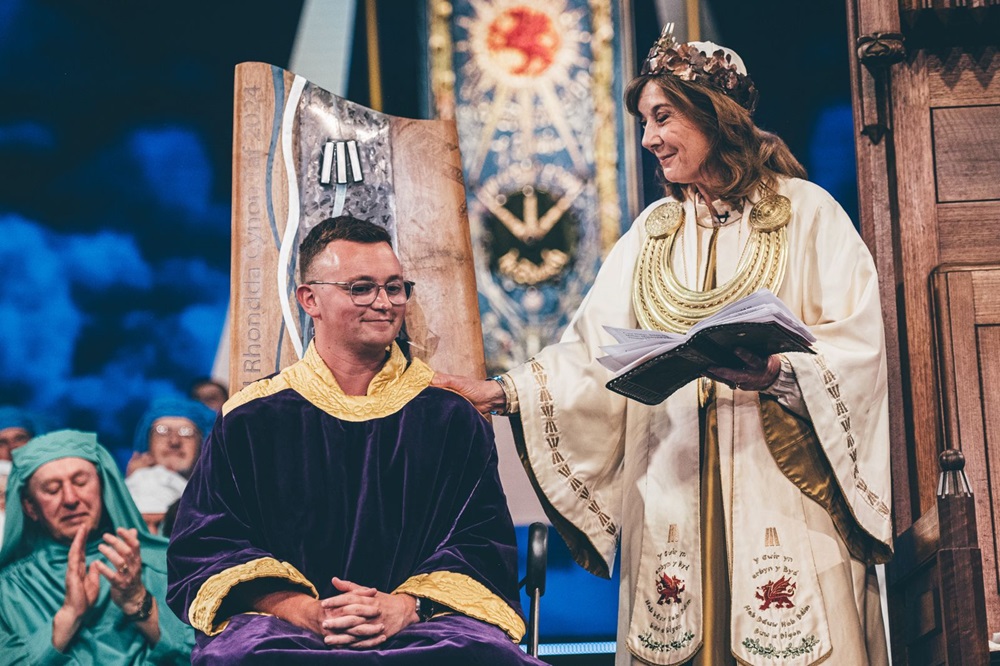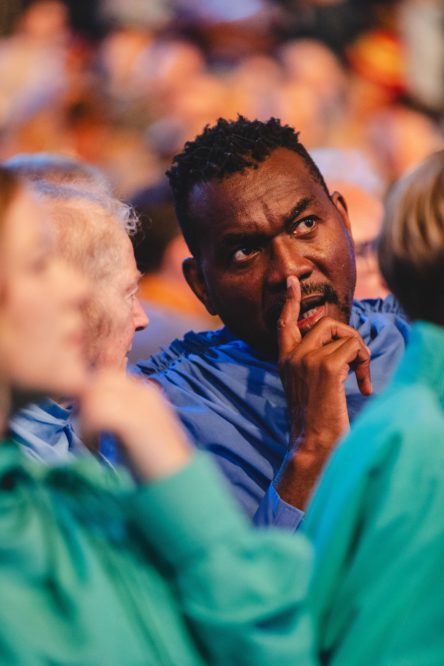The greatest poetic metre you’ve probably never heard of

Mererid Hopwood, Professor of Welsh and Celtic Studies, Aberystwyth University
Cast your mind back to August, if you can. As that somewhat sun-less summer drew to an end and we pushed fed-up and forlorn deckchairs back into the shed, in Cardiff a newly acclaimed poet, Carwyn Eckley, proudly unwrapped a rather magnificent chair. His to keep.
He is Wales’s latest chaired prifardd. And while prifardd might be rendered in English as “chief bard” or “chief poet”, the cultural significance of this title is lost in translation – the first of a handful of such terms that I’m going to share with you.
To become a prifardd, you need to compete in the Eisteddfod Genedlaethol, the annual Welsh cultural festival. One of its main attractions is the chairing of the bard ceremony.
This event, both solemn and joyful, is officiated by the Gorsedd, which is the gathering of what we call, derwyddon – two further untranslatable terms.
Gorsedd must be left as gorsedd. And derwyddon is the plural of derwydd, translated as “prophet, vaticinator, wise man” as well as “druid”. But these “druids” are not what you might imagine. To become a derwydd in the Gorsedd sense is to be honoured for services to Wales.
Cardigan Castle
While there are references to literary competitions in Wales dating back many centuries, it is generally agreed that the first of these is the record of a competition held in 1176 in Cardigan Castle instigated by Arglwydd Rhys (12th century prince) where it is noted that the winners were each honoured with a chair. Why a chair, though?
This was a time when becoming a court poet in Wales was to join a highly respected profession which later became a nine year-long apprenticeship, with grades from the elementary disgybl ysbas all the way to the heady hights of pencerdd or “head poet”.
Let’s zoom in on the second element in this word: pencerdd, namely cerdd. This can mean “poem” or “music” in Welsh, and is the first element in the normal word for music (cerddoriaeth). Understanding this enables us to begin to grasp the importance of prosody (the patterns of rhythm, sound and stress) in this poetic chair-giving tradition.
After the 1176 gathering, other notable Eisteddfodau are recorded in the 15th and 16th centuries. Fast forward to 1861 and to Aberdare when the National Eisteddfod tradition as we know it today began.
And from then until today, the chair has been offered every year (apart from a few where the ceremonies were postponed due to wars and COVID-19). Offered, but not always won. On a dozen or so occasions the adjudicators deemed that none of the poems entered was worthy of the much sought-after prize.
So what did Eckley do to earn the privilege of driving home in a pickup carrying such a prestigious piece of furniture?
Cynghanedd
He composed a 250-line poem in response to the given theme, Cadwyn (Chain), written according to the principles of cynghanedd. This is our next untranslatable term. Some English reference books describe cynghanedd as “the ancient Welsh strict metres”. In so doing, they confine this most beautiful code to a prison with doors double-locked by bygone times and inflexible rules.
And while this form of writing poetry does indeed have, on the one hand, a very old history, and on the other, a set of stringent rules, the English term here misses the point. A direct translation of cynghanedd is “harmony”. This gets us closer to the “music” – remember the pencerdd – we find in a line of poetry written according to these sophisticated principles.

The first principle is to be able to identify the stress in a word. This is partly why poets face such difficulty when seeking to adopt cynghanedd in English-language verse, for English does not have the overt stress patterns of Welsh. Once the stress has been established, the poet then listens out for the natural caesura of a line. These lines can be as short as four syllables or as long as 12 and more.
Next, the poet forms patterns of alliteration and assonance, end and internal rhyme, that together create harmony between the words on the different sides of the caesura. And while there are only four basic types of cynghanedd lines – cynghanedd lusg (echoing), cynghanedd draws (bridging), cynghanedd sain (sonorous) and cynghanedd groes (criss-crossing) – the variations are infinite.
The tightrope between the absolute and the tolerated transgressions add a thrill of danger to the practice. Those expert in the craft can use it as an instrument to find their own unique voice and express their own unique “songs” on any subject under the moon and the sun, until the craft becomes art.
Listen carefully to this couplet from Eckley’s winning poem, in which he describes visiting, as a four-year-old, the new part of the graveyard where his father lies:
Yna cyrraedd cae arall (then I reach another field)
Y cae yn llai, llai na’r llall. (a field smaller than the other)
The first line splits after the word cyrraedd, creating a rhythmic pattern where each half of the word has matching consonantal sounds and stresses: c/r | c/r. Here, the “|” symbol represents the natural pause in the line, while the “/” indicates the stressed syllables.
The second line follows a more complex pattern with two pauses: llai | llai | ll/. In this line, there is an internal rhyme linking the first and second parts. The second and third parts share consonantal sounds.
Does its power carry over from Welsh? Probably not. It’s a bit like looking at the black dots of a song on a stave; they need a voice to make them sing.
Sophisticated
The New Princeton Encyclopedia of Poetry and Poetics 1993 edition may well have declared: “In the detail and complexity of its patterning, cynghanedd is the most sophisticated system of poetic sound-patterning practiced [sic] in any poetry in the world”.
I can add that it’s also a key to a social scene that is popular and entertaining and to a tradition that keeps on attracting new voices, such as Eckley’s.
For my part, as the current Archdderwydd Cymru (our final untranslatable term, which, for now, we’ll call the “leader of the Gorsedd”), I shall close with enthusiastic encouragement to every would-be prifardd to start work on what might be next year’s winning poem. The date of the chairing ceremony is Friday 8 of August; the place: Wrecsam; the theme: Dinas (City). And bear in mind you may well need to hire a pickup.
This article was first published on The Conversation
![]()
Support our Nation today
For the price of a cup of coffee a month you can help us create an independent, not-for-profit, national news service for the people of Wales, by the people of Wales.







There is a marvelous guide to Welsh to listening to Welsh Poetry:
Singing in Chains – by Mererid Hopwood
It is in English.
Indeed – it’s an excellent presentation, in English, of what this “cynghanedd” is all about. First published 2004, two editions since… (And, as you note, it was written by Mererid Hopwood, who is both our current arch-druid and the person who wrote this present Nation.Cymru article.) As either a spoiler or a taster,let me explain that the title – “Singing in Chains” – refers to the (English language!) poem “Fern Hill” by Dylan Thomas – Dylan Morlais Thomas, to give him his full and more-Welsh-than-he sometimes-admitted name. Many of the lines are actually in Cynghanedd (“Harmony”), showing how “young Thomas”… Read more »
If Mererid’s article has interested you, and you want to learn Cynghanedd – well, first be warned! A bit like “learning the violin”, or any instrument or craft, it can be a lifetime’s dedication! (But of course you can enjoy hearing the violin at all times along that journey.) And although you’ll do this best through Welsh – and discover what RS Thomas called “our last stronghold” – that doesn’t mean you have to be fluent in Welsh before you start. (Think violin and beginner.) Indeed, just before Christmas a new group was started on Facebook by an Englishman, Neville… Read more »